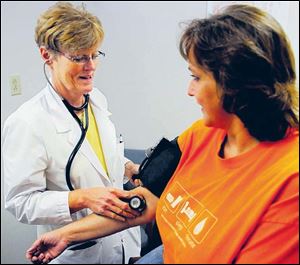
Nurse practitioners tackling more 'doctor' tasks
5/21/2012
Nurse practitioners are well-trained and capable of checking blood pressure, as well as other routine checks.
Many of your health care needs might soon be handled by a “doctor” who has actually been trained as a nurse.
Advanced registered nurse practitioners are increasingly performing duties once reserved for physicians, including diagnosing illnesses and prescribing medicine. It’s a trend that’s likely to continue as states grapple with escalating health care costs and a shortage of primary care physicians.
And they’ll be better trained, because of higher standards for nursing school accreditation that could go into effect as soon as 2015. Around the country, schools have been adding “doctor of nursing practice” programs, which they expect will soon become the standard degree for practitioners. They won’t be physicians, but you can call them doctor.
Nurse practitioners, who are registered nurses with a specialized master’s degree, used to be found mostly in rural areas where physicians were scarce or in public health settings where most patients were poor. But in recent years, private physicians have increasingly been hiring them to help manage their patient load.
Patient care isn’t suffering, according to several national studies, which have credited nurse practitioners for spending more time with patients and properly treating most routine medical conditions.
“Nurses often tend to have a holistic approach. They try to get to know all aspects of the patient, not just the medical condition,” said Susan Folden, a retired nursing professor of nursing at Florida Atlantic University.
There are nearly 18,000 nurse practitioners in the state, twice as many as a decade ago. They can handle more than 90 percent of a patient’s primary health care needs at a lower cost, so it makes sense they’re becoming more prevalent, said Sheldon Fields, an assistant dean at Florida International University’s College of Nursing.
“If you have a common cold, you don’t need to see a physician for that,” Mr. Fields said. “If you need a routine check for high blood pressure or diabetes or if a child needs a physical for camp, a nurse practitioner is well trained.”
They often perform a similar role as physician assistants, although the training and approach are different. Physician assistants receive specific medical training to diagnose conditions and serve the needs of a physician, while nurse practitioners are trained foremost as nurses and tend to focus more on preventative and maintenance care, experts say.
Nursing educators say patient care will further improve as nurse practitioners receive doctoral level training. They say practitioners will learn more about clinical research, health policy initiatives, and technology, giving them new tools to solve problems.
The American Association of Colleges of Nursing, which sets the standards for nursing schools, wants all nurse practitioner students to graduate with a doctor of nursing practice degree by 2015, although that could be delayed to 2020, experts say.
Some fear these new advanced degrees may lead to patient confusion.
“When someone calls themselves doctor, there is an assumption on the part of many that they are talking to a medical doctor,” said Rebecca O’Hara, vice president of governmental affairs for the Florida Medical Association, which represents physicians.
But nurse practitioners argue that many health care professionals who are not physicians already use the title “doctor”, including psychologists, podiatrists, and dentists.
There are also disagreements about whether the scope of nurse practitioners should be expanded.
Florida is one of only two states, the other being Alabama, where nurse practitioners are not allowed to prescribe controlled substances such as pain killers. It’s also one of a dozen that requires nurse practitioners to be supervised by a physician, making it difficult for the nurses to open their own practice.
A state Legislature report from December, 2010, said the state could save up to $339 million a year to Florida’s health care system if nurse practitioners and physicians assistants could prescribe these substances.
But physicians groups fear it could increase prescription abuse in a state already known as the pill mill capital of the United States.
Regardless of whether nurse practitioners get more autonomy, experts say it’s unlikely that they will replace physicians.
“We very much work in collaboration with physicians and other health professionals to find ways to provide for the optimal health and wellness of patients,” Mr. Fields said. “There is plenty of space and need for primary health care for all of us.”